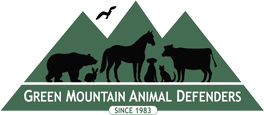
FARMED ANIMALS
"Once you see for yourself the routine cruelty involved in raising animals for food, you'll understand why millions of compassionate people have decided to leave meat off their plates for good."
- Alec Baldwin
Green Mountain Animal Defenders opposes the use of animals as food because whether they are raised for their flesh or by-products like eggs and milk, the animals' physiological and psychological needs are rarely met.
Factory-farmed animals are typically taken away from their mother as newborns. In addition, male chicks and calves not used for veal are simply disposed of as unmarketable by-products. The "lucky" animals are confined in tiny enclosures in which they very often suffer due to illness, overuse of antibiotics and growth hormones, and forced feedings before inevitably being slaughtered.
Nearly 10.2 billion land animals were raised and killed for food in the United States in 2010. - Report: Number of Animals Killed in US Increases in 2010, Farm Animal Rights Movement.
According to Meatout Mondays, 9 percent — more than 850 million — never made it to the slaughterhouse because they had already died from disease or injury caused by stress.
In addition to the abuses animals undergo while being raised and slaughtered, the farming of animals results in major environmental degradation. Carbon emissions from slaughterhouses and transportation vehicles, cropland used for agricultural feed, and animal waste by-products all contribute to ecosystem pollution. Also, farming animals as food is an inefficient use of resources.
"A meat-heavy diet requires 10 - 20 times as much land as a plant-based diet...even a 10 percent drop in United States meat consumption would make sufficient food available to feed the world's starving millions." - Green Your Diet, Farm Animal Rights Movement
Senior United Nations Food and Agriculture Organization official Henning Steinfeld recently reported that the meat industry is "one of the most significant contributors to today's most serious environmental problems."
Not prepared to be vegan? You can still reduce the harm done to animals by choosing more humane products. You not only pull financial support away from inhumane practices, but reduce the negative environmental effects of meat production and gain health benefits for yourself. Read "Humane" Farming, Egg Carton Labels, and Meat and Dairy Labels to learn more.
What Can You Do to Help?
Learn more about the treatment of farmed animals:
Become a vegetarian or vegan if you are not already one:
Choose Veg guide from Mercy for Animals
Improve your environmental impact through vegetarianism:
Participate in Great American Meatout and World Farm Animals Day events.
Report farmed-animal cruelty in Vermont.
Check out our campaigns.
With your donation, we can support the rescue and care of animals who are by-products of the meat or dairy industry, support animals removed during cruelty investigations and do much more.
Animals Used in Apparel
We expose the inherent cruelty of using fur, leather, exotic skins, feathers, etc. in fashion through demonstrations, letter-writing campaigns, and outreach events. We ask retailers to reconsider selling fur and inform our members of humane shopping choices.
Fur
Animals on fur farms spend their entire lives confined in cramped, filthy wire cages before they are killed for their skin. More than half of the fur sold in the United States comes from China, where even dogs and cats are killed for their fur. To makes matters worse, Chinese fur is often mislabeled, so there really is no way of knowing whose skin you are wearing.
Leather
Leather is commonly made from cows, pigs, goats, and sheep. Leather is normally not labeled. Therefore, just like with fur from China, you never really know from what kind of animal the apparel you are wearing came. Right here in the United States, let alone in countries like India and China, millions of cows killed for their skin first endure the horrors of factory farming. Buying leather directly reinforces factory farming and animal slaughter because skin is the most economically important byproduct of the meat industry.
Wool
Most of the world's wool comes from Australia, where sheep undergo "mulesing," a very painful wool-removal procedure in which sheep are commonly mutilated. Each year, millions of sheep discarded by the wool industry are crammed onto ships and exported to countries in the Middle East. Sheep who survive the terrifying voyage are then exploited even more by being inhumanely killed for meat.
Exotic Skins
The most common exotic skins used for clothing articles are the skins of snakes, lizards, alligators, and crocodiles. Snakes and lizards are skinned alive because of the belief that live flaying makes their skin softer. Kid goats are boiled alive to make supple gloves and the skins of unborn calves and lambs, some purposely aborted and others taken from slaughtered pregnant cows, are considered especially "luxurious."
How You Can Help
Shop Cruelty-Free; ask retailers to stop selling articles made from animals, and write thank you letters to retailers that are already cruelty-free.
No Foie Gras; In an effort to encourage local restaurants to eliminate foie gras from their menus, we have instituted a letter-writing campaign.
Baby Chick Rescue; In an effort to save the lives of sick or injured hatchlings that stores no longer have a use for, we discreetly rescue them and offer refuge. These hatchlings need transportation, medical care, and permanent homes.
Learn about our campaigns and subscribe to our action alerts.

